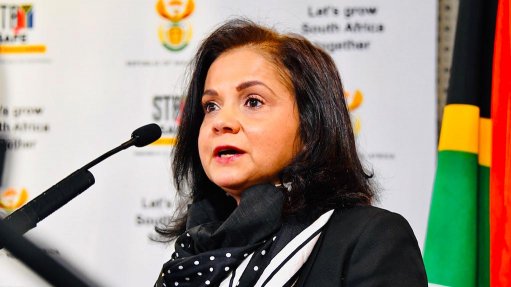
NDPP Shamila Batohi
National Prosecuting Authority head Shamila Batohi says, if government plans to go ahead with the establishment of a new corruption busting unit, it must be driven by prosecutors and housed in the National Prosecuting Authority (NPA).
"A multi-disciplinary agency has to be prosecution-led and it is crucial for such to be located in the NPA, with a strengthened legislative framework that guarantees independence," Batohi, the National Director of Public Prosecutions, told News24.
Last week, Justice Minister Ronald Lamola said the government felt there was a need for a permanent, multi-disciplinary corruption-fighting unit which would bring together law enforcement expertise from across the spectrum, including investigators and forensic experts. His comments follow a spate of revelations around alleged corruption related to the procurement of personal protective equipment by the state to combat the coronavirus.
The African National Congress (ANC) – many of whose senior leaders have been mired in allegations of graft for years – also called for the establishment of a new permanent unit after the conclusion of a meeting of its leadership last week.
News24 understands that legal opinions to explore the establishment of a new unit have been sought by the ministry of justice, while the NPA has also started to consider its options in order to, not only strengthen current structures, but to legally expand its mandate. Batohi is seemingly in close contact with Lamola, who on Monday was involved in high-level discussions in government on mechanisms to combat corruption.
Batohi, who became NPA boss in February last year, and shortly after that established the body's Investigating Directorate (ID) under advocate Hermione Cronje, agrees that a unit which possesses the ability to conduct criminal investigations is imperative.
The ID is wholly reliant on the police’s Directorate for Priority Criminal Investigations (commonly known as the Hawks) to assist prosecutors in getting investigations ready for court.
'We could have been miles ahead'
She says the ID’s lack of investigating capacity has "absolutely" hamstrung its work.
"There’s no doubt that we could have been miles ahead if the relevant expertise were readily available. We are dealing with big and complex cases that sometimes involve other jurisdictions. This is a gruelling challenge that involves a lot of forensic work on cellphone records analysis, flow of funds and dealing with other countries."
Batohi wants the ID to be strengthened and its model improved upon, rather than the establishment of a completely new entity outside of the NPA. She says there are "fundamental design flaws" in the ID model, due to existing legislation. The law as it stands prevents the NPA from appointing criminal and forensic investigators, and was changed in the wake of the dissolution of the Scorpions in 2008.
“However, with political will and the right resources, the ID can achieve its mandate. I have no doubt about that. It is imperative that the ID is immediately reinforced with sufficient resources and adequate capacity and capability. This will unleash the potential of the ID and significantly bolster the current efforts against corruption.
“We need to ensure that there’s no disruption to the present short-and medium-term endeavours against corruption and prosecution-led operations,” she says.
The best way to achieve success against corruption would be to allow the ID to evolve into an independent unit which is led by prosecutors, but working alongside criminal and forensic investigators under one roof, Batohi argues.
'Independence of NPA must be consolidated'
"There’s no doubt that, in order for the efforts against corruption to be effective, it has to be a multi-disciplinary prosecution-led, independent entity, housed under one roof and free from any undue, in particular political, influence.
"The independence of the NPA becomes mandatory under these immediate needs, and must therefore be strengthened to ensure that no external interference – or perceived interference – is possible."
The government disbanded the Directorate of Special Operations, or the Scorpions, in 2008. The unit was housed in the NPA and followed the so-called "troika model", whereby prosecutors worked alongside investigators and forensic experts. The DSO was dissolved after an extended political battle inside the ANC between then-president Thabo Mbeki and Jacob Zuma, who became president in 2009.
Batohi says the legislative and constitutional framework to ensure the NPA and the ID’s independence must be "robust" to ensure insulation against "undue political or other external influence".
"It is important that the envisaged outfit be gradually and organically introduced to avoid disruptions. We should consider how instruments like the ID can evolve to such an entity within the NPA.
"However, that would prescribe that there be safeguards: the independence of the NPA must be consolidated."